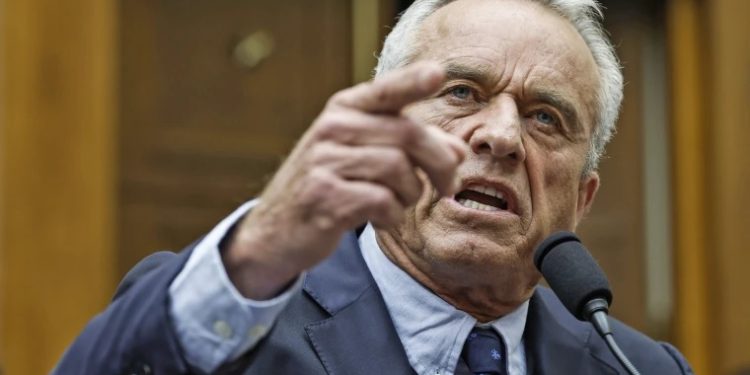Presidential hopeful Robert F. Kennedy, Jr., running as an independent candidate, has expressed solidarity with Republican-led legal actions accusing the Biden administration of unlawfully pressuring social media platforms to censor material.
According to The Hill, as the Supreme Court examined two significant cases on social media censorship, Kennedy aligned himself with Louisiana and Missouri in their legal challenge against the White House. Kennedy, who is vying for the presidency in 2024, argues that the Biden administration sought to silence his own social media posts, echoing the core contentions raised by Louisiana and Missouri. Speaking with NewsNation’s Chris Cuomo, Kennedy stated, “I believe the government shouldn’t intervene. While social media platforms are free to establish guidelines or community standards, once government interference occurs, especially impacting the First Amendment, matters spiral out of control.”
At the heart of the Supreme Court cases are allegations that the Biden administration improperly influenced social media companies to restrict accounts allegedly disseminating misinformation about the COVID-19 pandemic. Louisiana and Missouri assert that such actions infringed upon the First Amendment rights of those targeted for censorship.
Kennedy’s personal encounter lends credence to the states’ arguments. In January 2021, his social media accounts faced restrictions following his dissemination of misinformation regarding the COVID vaccine’s role in the death of baseball icon Hank Aaron—a claim refuted by medical experts. Kennedy claims that the White House directed social media platforms to limit his accounts, prompting him to file a separate lawsuit against the administration.
Though Kennedy obtained a temporary injunction in his case last month, it was put on hold pending the Supreme Court hearings. Justices appeared divided during the oral arguments, with both liberal and conservative members expressing concerns about the potential ramifications of the states’ positions.
Justice Ketanji Brown Jackson, for example, queried whether the states’ stance might unduly restrict government actions during critical periods. Conversely, other justices seemed sympathetic to the argument that the government had exceeded its authority by influencing content moderation decisions.
The cases stem from a federal judge’s order in Louisiana last July, which initially prohibited Biden administration officials from engaging with social media companies regarding the removal of content deemed “protected free speech.” Although a three-judge panel on the 5th U.S. Circuit Court of Appeals modified the initial order in September, it concurred that administration officials likely breached the First Amendment by seeking the removal of specific content.
As the Supreme Court deliberates, the lower court rulings remain on hold during the appeals process. The ultimate decision could significantly impact the extent of government intervention in online speech and the degree to which social media platforms can be swayed by political pressures.
 Telegram is where we really talk. Don't miss out!
Telegram is where we really talk. Don't miss out!







